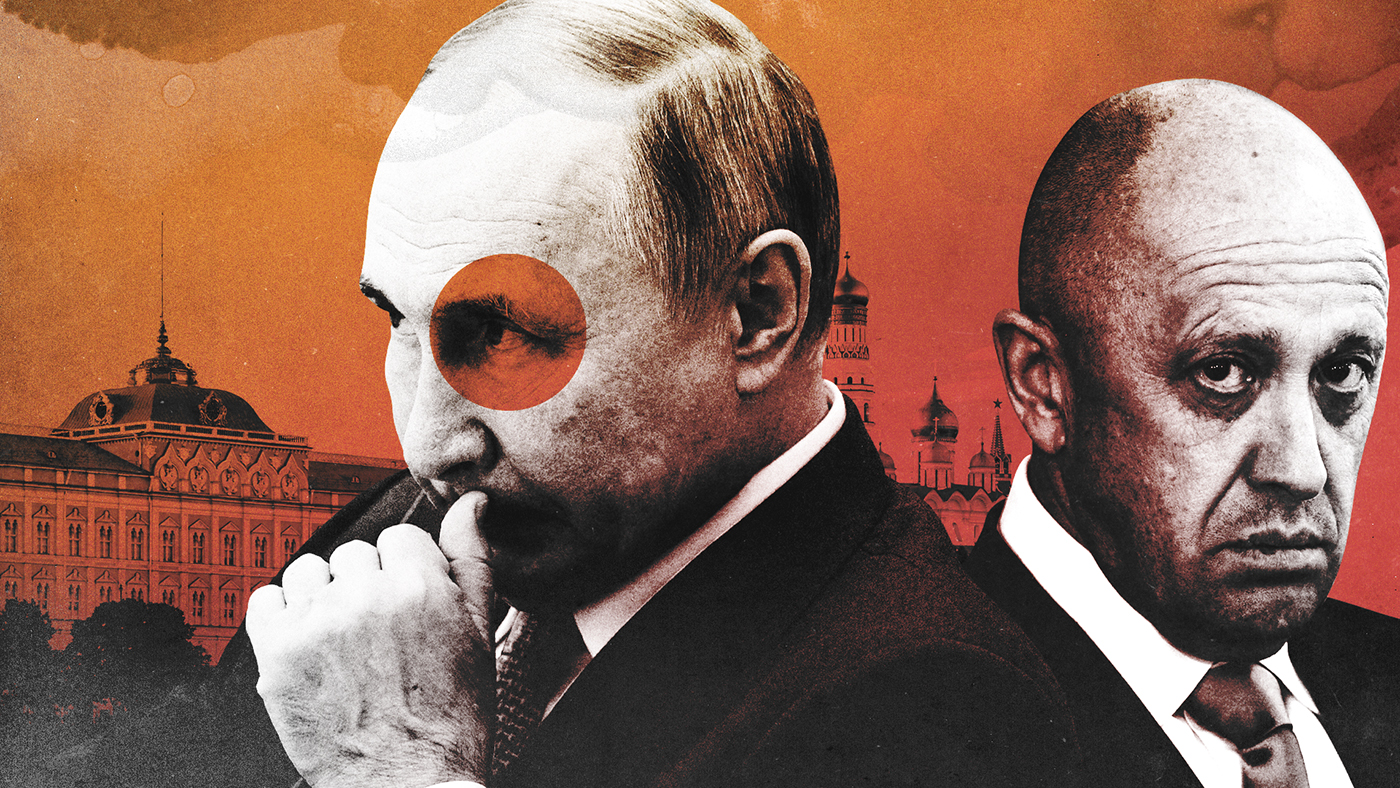Putin vs. Wagner: saved by kompromat?
Analysts believe the mercenary may know too much about the workings of the Kremlin

A free daily email with the biggest news stories of the day – and the best features from TheWeek.com
You are now subscribed
Your newsletter sign-up was successful
If you’re not “feeling confused” by events in Russia in the past few weeks, “then you’ve probably not been paying attention”, said Michael Day in The i Paper.
After Yevgeny Prigozhin and his Wagner Group’s aborted rebellion against the Kremlin, the warlord and his mercenaries were officially forgiven, which was strange “in a country where simply criticising the war can get you ten years in a penal colony”. However, conditions were imposed: Prigozhin and his men would move to neighbouring Belarus; those who stayed were to join regular Russian units. It was expected, even so, that Prigozhin would be assassinated on President Putin’s orders.
‘Putin-Prigozhin grudge match’
That hasn’t happened. On the contrary, Putin’s “former cook and butcher-for-hire” isn’t, it seems, cowering in Belarus. Last week, he was in St Petersburg (no doubt checking his underwear carefully for Novichok). He is even said to have met Putin personally since the mutiny.
The Week
Escape your echo chamber. Get the facts behind the news, plus analysis from multiple perspectives.

Sign up for The Week's Free Newsletters
From our morning news briefing to a weekly Good News Newsletter, get the best of The Week delivered directly to your inbox.
From our morning news briefing to a weekly Good News Newsletter, get the best of The Week delivered directly to your inbox.
The “Putin-Prigozhin grudge match” is certainly not over, though, said Mark Galeotti in The Spectator. Last week, the Federal Security Service (FSB) released footage of a raid on Prigozhin’s St Petersburg estate. Amid the “predictably tacky decor” were vast stacks of cash; a framed photo of severed heads; a giant sledgehammer, of the kind used to execute Wagner deserters; and “a closet full of wigs”, along with a series of selfies of Prigozhin in bizarre disguises (possibly real, or possibly faked by the FSB).
Yet Wagner units have been neither stood down nor integrated into the Russian army. As ever, Kremlin politics is fiendishly hard to read, said Max Seddon and Polina Ivanova in the FT. But it seems that Putin regards Prigozhin as too dangerous and important to eliminate. He is all too aware of how close the Wagner mutiny came to Moscow. And Prigozhin’s business empire “sprawls” from the front lines of the Ukraine War to school catering, and internet troll farms to mercenaries across Africa and the Middle East. So instead of killing him, Putin has decided to undermine and humiliate Prigozhin – to finish him as a political figure, if not as a businessman.
‘Copious amounds of kompromat’
Other explanations have been offered for Prigozhin’s survival, said Yulia Latynina in The Hill. One is that he possesses “copious” amounts of kompromat related to the mind-boggling levels of corruption in Putin’s regime, as well as God knows what else. Another is that if Wagner had been crushed, it would have been by Nikolai Patrushev, the head of Russia’s “deep state” who pulls the strings at the FSB – who was reportedly apprised of the plot well in advance.
That outcome would have made Putin look clueless, and Patrushev “the biggest guy” in Moscow. So frantic efforts were made to reach a negotiated solution. If this sounds “highly convoluted” and conspiratorial, well, that is the nature of Putin’s governing elite: “a three-ring circus” staffed by “crazy people”, constantly jostling for power. Putin created it, “and now he reaps what he sowed”.
A free daily email with the biggest news stories of the day – and the best features from TheWeek.com
-
 How the FCC’s ‘equal time’ rule works
How the FCC’s ‘equal time’ rule worksIn the Spotlight The law is at the heart of the Colbert-CBS conflict
-
 What is the endgame in the DHS shutdown?
What is the endgame in the DHS shutdown?Today’s Big Question Democrats want to rein in ICE’s immigration crackdown
-
 ‘Poor time management isn’t just an inconvenience’
‘Poor time management isn’t just an inconvenience’Instant Opinion Opinion, comment and editorials of the day
-
 New START: the final US-Russia nuclear treaty about to expire
New START: the final US-Russia nuclear treaty about to expireThe Explainer The last agreement between Washington and Moscow expires within weeks
-
 What would a UK deployment to Ukraine look like?
What would a UK deployment to Ukraine look like?Today's Big Question Security agreement commits British and French forces in event of ceasefire
-
 Would Europe defend Greenland from US aggression?
Would Europe defend Greenland from US aggression?Today’s Big Question ‘Mildness’ of EU pushback against Trump provocation ‘illustrates the bind Europe finds itself in’
-
 Is conscription the answer to Europe’s security woes?
Is conscription the answer to Europe’s security woes?Today's Big Question How best to boost troop numbers to deal with Russian threat is ‘prompting fierce and soul-searching debates’
-
 Trump peace deal: an offer Zelenskyy can’t refuse?
Trump peace deal: an offer Zelenskyy can’t refuse?Today’s Big Question ‘Unpalatable’ US plan may strengthen embattled Ukrainian president at home
-
 Vladimir Putin’s ‘nuclear tsunami’ missile
Vladimir Putin’s ‘nuclear tsunami’ missileThe Explainer Russian president has boasted that there is no way to intercept the new weapon
-
 The Baltic ‘bog belt’ plan to protect Europe from Russia
The Baltic ‘bog belt’ plan to protect Europe from RussiaUnder the Radar Reviving lost wetland on Nato’s eastern flank would fuse ‘two European priorities that increasingly compete for attention and funding: defence and climate’
-
 How should Nato respond to Putin’s incursions?
How should Nato respond to Putin’s incursions?Today’s big question Russia has breached Nato airspace regularly this month, and nations are primed to respond